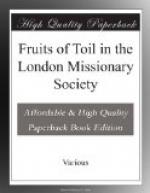[Illustration: ANDRIAMBELO.]
VII.—THE NATIVE CHURCHES.
The high and useful position attained by the Society is further illustrated by the character and importance of the Native Churches. These are our actual converts, the most striking, the most patent, if not the most real among the fruits of our past labours. These churches are unevenly distributed, but the explanation is easy. As a rule, they are largest in fields of labour which have been longest cultivated, and where converts are easily won. They appear, therefore, in inverse ratio to time and difficulty. To the native races of Polynesia, desolated by wars, torn in pieces by faction and strife, Christianity came as the healer and peace-maker, and was welcomed as soon as understood. To the native races of South Africa, and to the people of the West Indies, to the weak who had been crushed and enslaved by the strong, it came with loving smiles as deliverer and friend. By the devil-worshipper of Travancore, ignorant, degraded, friendless, afraid of malignant spirits, it was welcomed for its kindness. To the caste-ridden people of the great cities and towns, to the sudra of South India, to the Brahmins everywhere, it came as an enemy, destroying their social life, breaking up the bonds of Hindooism, smiting the gods, putting down the priesthood, destroying the vested interest, and drying up the wealth produced by centuries. Who can wonder that to the learned, the powerful, the bigoted, it was “foolishness;” while to the despised and poor, accepted in a child-like spirit, it became the power of God unto salvation? As a rule, the converts, who were easy to win, have been hard to raise; and in ordinary Christian life some of the most zealous, the most consistent, the most liberal, the most missionary, have been found among the few converts, drawn by hard struggles and heavy penalties, from the caste population of our Indian towns. It is from such came nearly all our first ordained Native Ministers.




